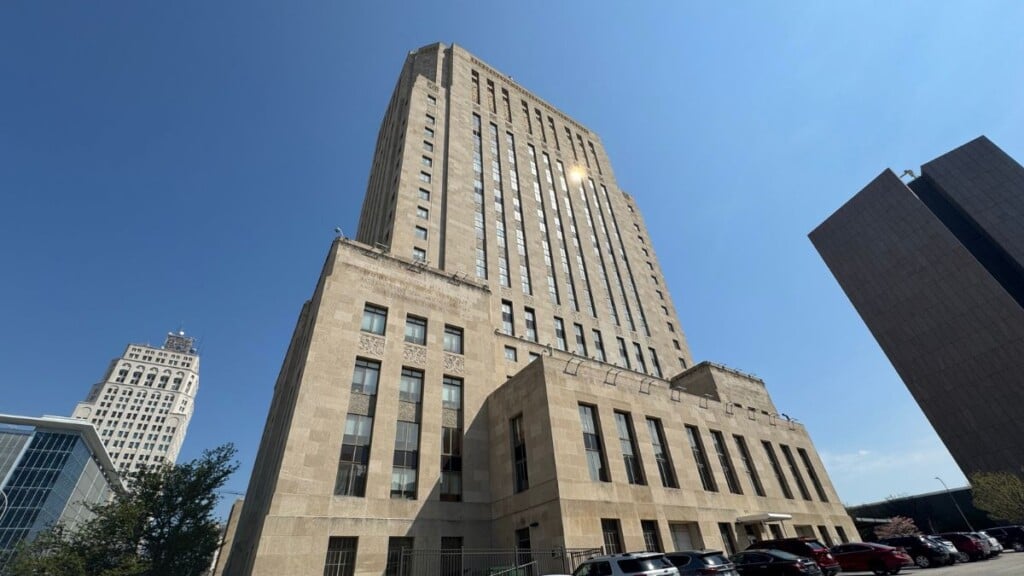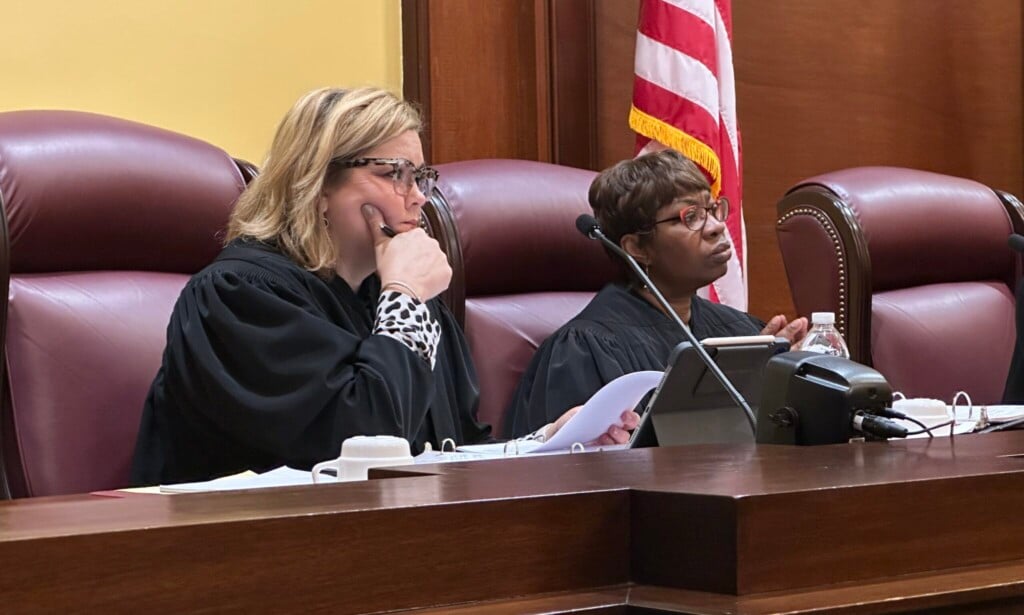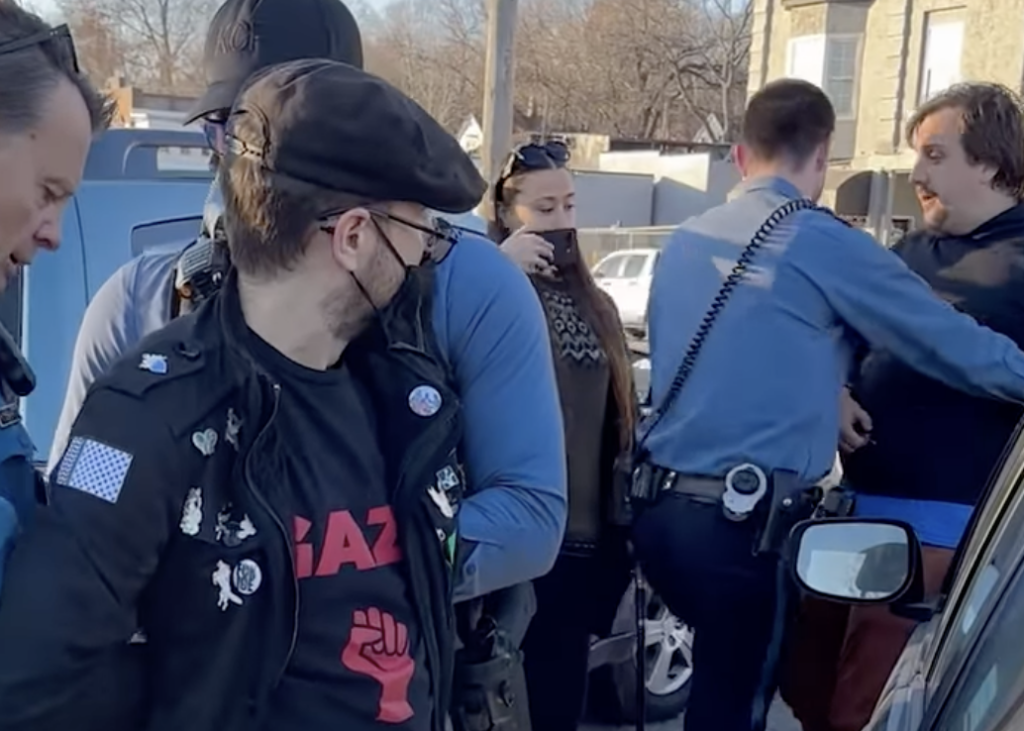Missouri AG Andrew Bailey just sued Starbucks over DEI. Taxpayers shouldn’t cover the cost of this man embarrassing us.
With Bailey's latest performative, grievance-fueled stunt, there are already plenty of reasons he could (and should) lose. As the chief legal officer for the Show Me State, he is wasting everyone's time.

Missouri Attorney General Andrew Bailey, shown speaking with reporters Jan. 13, was grilled by lawmakers Wednesday about his office budget and a new lawsuit filed against Starbucks accusing the company of discrimination. (Annelise Hanshaw/Missouri Independent)
Missouri Attorney General Andrew Bailey, the far-right Republican who won his first full term in office in November 2024, announced that he filed a lawsuit against Starbucks Corporation in federal district court in St. Louis. He alleges that the publicly traded multinational coffee chain has discriminated against Missourians using its diversity, equity, and inclusion (DEI) policies.
“With Starbucks’ discriminatory patterns, practices, and policies, Missouri’s consumers are required to pay higher prices and wait longer for goods and services that could be provided for less had Starbucks employed the most qualified workers, regardless of their race, color, sex, or national origin,” said Bailey in a press statement.
That seems all well and good to fight against racism and sex-based discrimination, but remember who this is coming from – Andrew Bailey.
He is the same attorney general who fought to keep a potentially innocent black man on death row. Bailey wasted tax dollars trying to infringe on the sovereignty of another state’s criminal justice system and lost. He is the same man justifying teenage pregnancies as an argument to a court asking that the Food and Drug Administration’s approval of mifepristone be overturned.
Bailey is also the same piece of shit who used his position to infringe upon the rights of trans people and their families. To simplify this, Bailey fellated Donald Trump for his endorsement during the election by being an exceptionally terrible, bigoted, and genuinely shitty individual.
The Starbucks lawsuit is the latest in performative politics by the chief legal officer for the Show Me State, and, by all accounts, it’s going to be another bust.
Here’s why.
A review of the lawsuit shows deep disdain for the concept of DEI as a business practice. Not only is the lawsuit timely, but it tries to implicate one of the largest retail coffee chains in the country. Allow me to clarify that I have no love for Starbucks, especially given its environmental record and its work against unionization. What Bailey is trying to do, though, is embarrassingly ignorant and performative.
A spokesperson for Starbucks told news outlets they believe the lawsuit to be entirely baseless. They said, “We disagree with the attorney general, and these allegations are inaccurate. We are deeply committed to creating opportunity for every single one of our partners (employees). Our programs and benefits are open to everyone and lawful.” In fact, the baseless claims are glaring.
No evidence was provided by Bailey’s office in the complaint to suggest any link to DEI being a direct cause of detriment to the company, consumers in Missouri, or really any of its employees.
Starbucks stands accused by Bailey of reverse discrimination against white men. He explicitly notes in the lawsuit that “[Starbucks’] workface has become more female and less white.” If you get past the word “workface” being used, the attorney general basically says that a lack of white men who serve crappy coffee is tantamount to illegal conduct in violation of federal and state anti-discrimination laws.
The legal complaint goes on to allege that DEI policies adopted by Starbucks executives are directly at fault for the increases in prices of their products and for the increased wait times for customers seen in recent years. Yes, the Missouri attorney general thinks that a lack of white men serving coffee forces a climb in prices on a venti caramel macchiato. And, somehow, that is a threat to the general public. I am not surprised by any of this, though.
Bailey’s actions align squarely with the executive orders of President Trump that target diversity, equity, and inclusion programming, policies, and experts in the federal government. This is also a dress rehearsal for the new head of the Department of Justice, U.S. Attorney General Pam Bondi.
To great fanfare in right-wing circles, one of Bondi’s first internal memorandums that were made public directed the major divisions of the DOJ to prepare for potential civil and criminal actions against private companies and higher educational institutions that have DEI programs in place. A directive such as this gives state legitimacy to anti-DEI efforts from individuals who don’t even know the first thing about diversity, equity, and inclusion programs as they relate to compliance.
I am not dismissing the many large companies moving away from DEI programs. Leadership at those firms have every right to manage their workforces and corporate cultures so long as they aren’t violating the law. Regardless of that, there are major companies that still have policies and programs that promote DEI in place, including Starbucks. In the matter of a company being left to practice DEI in the workplace, a case can be made that any sort of law or incursion on private enterprises could meet strong constitutional headwinds – namely, the First Amendment. In 2024, the U.S. Eleventh Circuit Court of Appeals found a key provision in a controversial Florida law to be in violation of the First Amendment. The law in question was Florida’s Stop WOKE Act.
“[Florida] seeks to bar employers from holding mandatory meetings for their employees if those meetings endorse viewpoints the state finds offensive,” a panel of Eleventh Circuit judges said. The same judges noted, “But meetings on those same topics are allowed if speakers endorse viewpoints the state agrees with, or at least does not object to. […] No matter how controversial the ideas, allowing the government to set the terms of the debate is poison, not [an] antidote.”
Florida tried to regulate employers by prohibiting mandatory inclusivity training sessions but said that mandatory training was acceptable if it dealt with subject matter approved by the state. A first-year law student can see, easily the freedom of speech implications of such a law here. While Bailey’s lawsuit against Starbucks doesn’t deal with a statute like the Florida law, it goes to show the degree to which these “anti-DEI” and “anti-woke” initiatives by the far-right are based on moral panic and the implicit and explicit bigotry against people of color, women, and LGBTQ+ people.
Chances are, the lawsuit will be thrown out – and hopefully with prejudice. I base that prediction on what happened during a lawsuit involving a conservative think tank and Starbucks that was before a federal district court in the state of Washington in 2023.
According to court documents, the National Center for Public Policy Research filed a shareholder derivative lawsuit, supposedly on behalf of Starbucks, against certain executives, officers, and directors of the board for the company’s diversity initiatives. Not only was this lawsuit dismissed with the prejudice of the court, but the judge characterized the conservative group’s claims as incredible.
“[It] is clear to the court that [this think tank] did not file this action to enforce the interests of Starbucks, but to advance its own political and public policy agendas,” explains the federal district judge in a ruling. “This complaint has no business being before this Court and resembles nothing more than a political platform. Whether DEI […] initiatives are good for addressing [any] long-simmering inequalities in American society is up for the political branches to decide.”
In the order dismissing the case, the judge explained the conservative think tank failed to “rebut the business judgment presumption.” According to Cornell Law School’s Legal Information Institute, a business judgment rule “provides a director of a corporation immunity from liability when a plaintiff sues on grounds that the director violated the duty of care to the corporation so long as the director’s actions fall within the parameters of the rule.” This means that executives and officers are ultimately immunized from any liability generated by innovating internal policy.
Bailey’s suit against Starbucks over DEI follows the vein of the U.S. Supreme Court ruling that affirmative action is unconstitutional. Bailey cites the high court by affirming that “[e]liminating racial discrimination means eliminating all of it.” Despite the ruling, one of the key errors made by critics of diversity, equity, and inclusion programs is characterizing it as “affirmative action 2.0.” DEI and affirmative action are different.
Affirmative action tackles past discrimination by considering race, gender, and other factors in hiring, education, and contracts. DEI programming takes a bigger-picture approach, focusing on fairness, inclusion, and eliminating bias in systems. Historically, DEI has improved business models and practices with long-term success.
Whether a firm chooses to build out its diversity programs or promote an inclusive corporate culture, there is absolutely no justification for an elected official or government to dictate what is “acceptable.”





